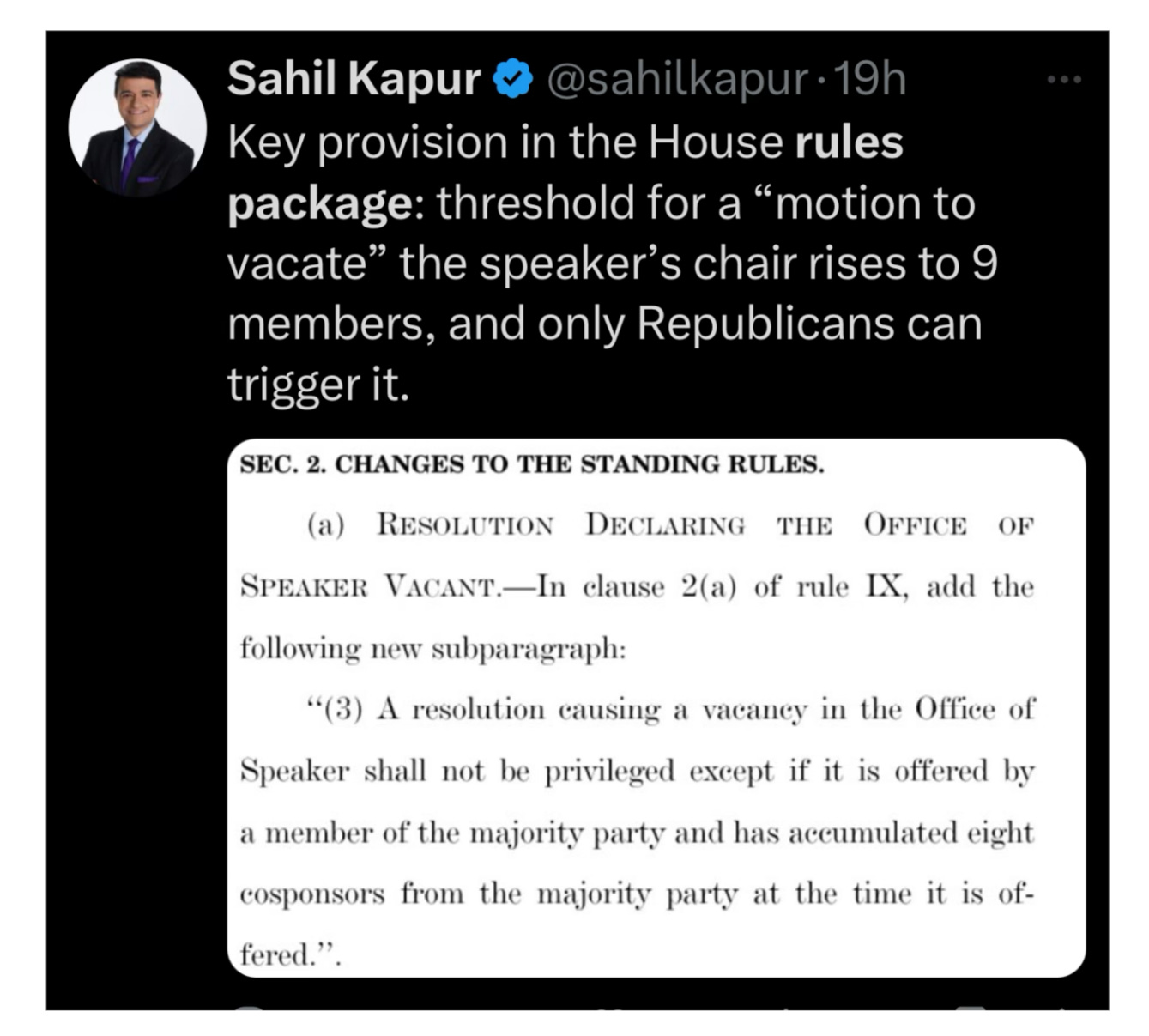The House GOP’s First Test
Speaker Johnson has an aggressive agenda in mind. But first he must win reelection, and he can’t afford another defection.
If he weren’t such a spineless, toothless man, I’d almost feel sorry for Speaker Mike Johnson.
Today is the day that he is up for reelection as House Speaker. In any normal cycle, this would be a shoo-in for Johnson. After all, the GOP maintained its majority, even if it is threadbare. And Republicans have an ambitious agenda of truly nasty and regressive policies they want to push forward, with far greater chance of success now that the Senate is in Republican hands, too.
Still, no one is quite certain how today’s election will go. There are a number of far-right Freedom Caucus members who remain “undecided” and could seek to leverage their ability to block Johnson in exchange for more power and authority and a prioritization of their own policies.
With Rep. Thomas Massie (R-KY) already a “no,” the math says, assuming everyone shows up today in Congress for work, that all it takes is one of them to vote “present” instead of “yes” and Johnson won’t have the votes.
Update: Johnson was initially denied the gavel in the first round when three members of the GOP voted for someone else. Johnson took two aside and they then flipped their vote to him, securing for him the Speakership.
So let’s lay out some of the history and the stakes. Whatever happens today, it will be a sign of how functional—or dysfunctional—the GOP will likely be at least for the critical first 100 days of the 119th Congress.
Don’t be like Kevin
Speaker Johnson doesn’t want to pull a Kevin McCarthy. Two years ago, it took McCarthy 15 rounds of voting and agonizing concessions to the far-right to finally win enough votes to become Speaker. It was not only an embarrassingly chaotic start to his tenure, it contained the seeds of McCarthy’s destruction.
Specifically, McCarthy gave so much power to the far right, including granting the right to a single House member to move to vacate the chair and handing over plum Rules Committee assignments to some of the most hardcore Freedom Caucus members, that he was essentially held hostage by the extremists from the get go. Because he couldn’t move his own budget bills through the Rules Committee, McCarthy had to rely on Democrats to pass legislation through special procedures.
For this sin, McCarthy was ousted.
After a series of bruising battles for the speakership, which wound up proving that the GOP was truly rotting from within, Johnson became Speaker by default: a man barely anyone knew, conservative enough to win the trust of the far right yet soft spoken enough to appease the less extreme Republicans.
But in the end, Johnson also had to rely on Democratic votes to pass budget resolutions, earning him the ire of the far right. But while many of them are disappointed or even disgusted by his leadership, there are no other choices. Indeed, Johnson is running unopposed because everyone knows that no other candidate could get close to 218 votes.
Still, the fact that Johnson needs every vote other than Rep. Massie’s to become Speaker means that anyone who wants to hold out for a sweeter offer or concession can torpedo the process. That kind of leverage doesn’t come around often, and it may prove too tempting for members not to give it a whirl, especially those who enjoy political bomb throwing and fundraising off of trolling their own party.
Johnson has the benefit of Trump’s endorsement, who could put pressure on wayward members not to hold up his certification through some kind of grandstanding. That may prove enough to tamp down dissent, but if it doesn’t it could further undermine Trump’s authority from the get go. He’s already lost one battle with the Freedom Caucus over raising the debt ceiling as part of the most recent government funding extension; if that caucus thumbs its nose at him again over the speaker battle it would be a bad look for the president-elect.
Update: The initial setback in the notes was reversed, but it’s unclear what if any promises Johnson provided to Reps. Donaldson and Norman to get them to flip their votes.
The new rules package is a possible target
It’s standard practice for an incoming Speaker to set out a package of rules for the House to vote on. This set of rules will govern how the House handles business overall. Often it is simply an adoption of existing rules with some modifications.
Johnson has proposed a “rules package” that grants him more protections than McCarthy had. Most notably, it changes the number of people who can force a motion to vacate from one to nine, and it limits the right to members who are part of the majority governing party, in this case Republicans.
Making rules that only allow certain members of one party to do something is highly unusual and facially undemocratic. In this case, it is a slight more symbolic than impactful: Under the old rules, any efforts by a Democrat to move to vacate the chair would never see a House floor vote anyway because the Speaker and the Rules Committee get to determine which bills come to the floor and when. But putting the limitation right into the rules package itself is a discomfiting step toward one-party rule.
Members of the Freedom Caucus who aren’t happy with Johnson could ask that the proposed number of nine GOP members be reduced as a part of a concession to them. Here, Johnson is likely to push back, as he doesn’t want a sword hanging over his head like McCarthy had the entire time he was Speaker. Indeed, more centrist Republicans have warned Johnson not to start loading up the rules package with concessions to the hardliners just to win their votes. They also don’t want to see a repeat of McCarthy’s neutered leadership.
As Axios reported,
There have been “scores” of “regular” House Republicans warning Johnson even against handshake deals that may put the rest of his conference in a bind, four House Republicans familiar with the outreach told Axios.
“There are significant communications,” said one of the lawmakers, who told Axios that these GOP moderates are warning Johnson: “Don’t do what [former Speaker Kevin] McCarthy did.”
“Don’t give promises upon which you can’t deliver. Don’t give promises that require us to do things that we don’t want to do, that are beyond reasonable,” the lawmaker said.
Another told Axios: “You cannot trust these guys who undermine us at every point. They ask for first base, the speaker gives it to them, and they ask for second base. ... Don’t cater to [them].”
Chief among the concerns is that a hardliner like Rep. Chip Roy (R-TX) could demand a powerful, veto-like role on the Rules Committee, which is responsible for determining which bills come to the floor and in what fashion or under what restrictions. Speakers traditionally control their party’s agendas by putting their most trusted allies on the Rules Committee. If Johnson has to put people like Roy there just to become Speaker, then like McCarthy he could become a SINO—a Speaker in Name Only.
The nasty items
Apart from the shift in the number and nature of the members who could seek to oust the speaker, the rules package also takes a sledgehammer to things like Diversity, Equity and Inclusion by dissolving that congressional office and authorizes subpoenas of Attorney General Merrick Garland and other officials connected to the investigation of the Bidens.
In short, the rules package is out of the gate with politicization and partisan extremism. The top Democrat on the Rules Committee, Rep. Jim McGovern (D-MA), blasted the package in an epic Twitter thread, which is worth reading in full. (Pay attention to McGovern; he is a great communicator and takes no prisoners with the GOP.)
“You’d think House Republicans might look at their failures and try to change course by working with Democrats, as we’ve been asking, to address the major problems facing our country,” McGovern wrote. “This makes it clear that they have no intention of working together to find common ground,” he added.
GOP legislative “priorities”
At the end of the rules package is a laundry list of bills that are to receive special treatment by the GOP House, meaning they are out of “regular order” and can’t be amended by anyone. It’s an up or down vote designed to ram through an extremist agenda in the early days of the new Congress.
The agenda prioritizes a host of GOP wishlist items that attack immigrants. One bill would require the Department of Homeland Security to take into custody any migrants charged with theft. Another would make so-called sanctuary cities ineligible for federal funds that support migrant services.
The items also include an attack upon trans athletes by insisting that purely biological sex distinctions in sports are protected under Title IX rules.
One bill would prohibit any moratorium on hydraulic fracking. And one even appears designed specifically to benefit Israeli Prime Minister Benjamin Netanyahu by allowing the U.S. government to impose sanctions on the International Criminal Court if that body goes after “any protected person of the United States and its allies.” Netanyahu is currently under investigation by the ICC for war crimes.
Rep. McGovern blasted this list:
Here’s what I see: Nothing to help workers. Nothing to bring down grocery prices. Nothing on lower rent or affordable housing. Silent on inflation & healthcare costs.
Next to nothing on jobs & the economy.
Instead, I have no doubt they’ll find plenty of time to pass tax breaks for billionaires and massive corporations at the expense of everyday Americans.
Many of these “culture war” bills are designed to pin down Democrats by making them vote against things that many more conservative Americans favor, especially around immigration and trans rights.
Assuming Johnson can win the speakership, either on the first vote or after granting some concessions, the House likely will pass many of these bills through an up or down party line vote. But that doesn’t mean they will become law. They still have to get through the Senate where, at least for now, many would be subject to the filibuster. In that sense, many of these “priorities” are fairly empty gestures, and the true test will be when the House seeks to pass a budget, to slash funding to government benefits or programs, or to extend the Trump tax cuts to corporations and wealthy Americans.
Johnson was unable to move any legislation through during the last Congress, in part because of his narrow majority and in part because of Democratic control of the Senate. Republicans are now in charge in the other chamber, but Johnson will have an even slimmer majority in the House to work with. Indeed, in the first few weeks, Johnson can’t even afford a single defection because they will be down three seats due to House member resignations and appointments to the Trump cabinet.
Thoughts and prayers, Speaker Johnson.







Correction: Paragraph 4 should be “Johnson” and not “McCarthy.” The two have such similar trajectories it’s easy to mistake them!
What about the GOP representative nobody even noticed was missing, found in a memory care home? Is she considered a member of the House? Has she been replaced?